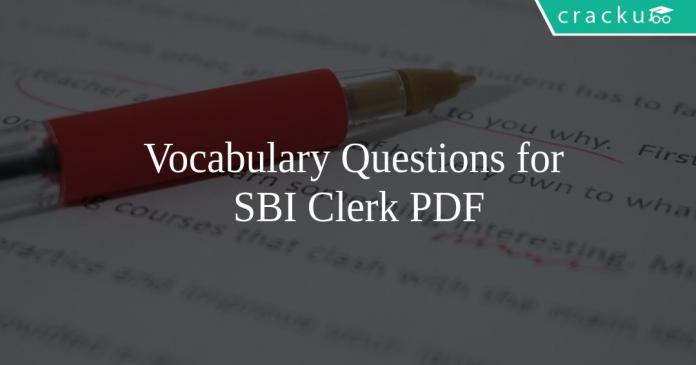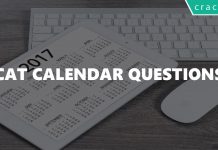Vocabulary Questions for SBI Clerk PDF
Download SBI Clerk Vocabulary Questions & Answers PDF for SBI Clerk Prelims and Mains exam. Very Important SBI Clerk Vocabulary Questions with solutions.
Download Vocabulary Questions for SBI Clerk PDF
105 SBI Clerk mocks for Rs. 199. Enroll here
Instructions
Direction: In each of the following questions four words are given of which two words are most nearly the same or opposite in meaning. Find the two words which are most nearly the same or opposite in meaning and indicate the number of the correct letter combination, by darkening the appropriate oval in your answer sheet.
Question 1: (A) consent
(B) nascent
(C) emerging
(D) insecure
a) A – C
b) B – D
c) B – C
d) A – D
e) A – B
Question 2: (A) elated
(B) eccentric
(C) explicit
(D) abnormal
a) A – B
b) B – D
c) A – C
d) A – D
e) D – C
Question 3: (A) abundance
(B) incomparable
(C) projection
(D) plethora
a) A – C
b) A – B
c) C – D
d) B – D
e) A – D
Question 4: (A) purposefully
(B) inaccurately
(C) inadvertently
(D) unchangeably
a) A – C
b) A – B
c) B – C
d) B – D
e) A – D
Question 5: (A) germane
(B) generate
(C) reliable
(D) irrelevant
a) B – D
b) B – C
c) A – B
d) C – D
e) A – D
Instructions
Directions : In each of the following questions four words are given, of which two words are most nearly the same or opposite in meaning. Find the two words which are most nearly the same or opposite in meaning and indicate the number of the correct letter combination, by darkening the appropriate oval in your answer sheet.
Question 6: (A) consent (B) nascent (C) emerging (D) Insecure
a) A – C
b) B – D
c) B – C
d) A – D
e) A – B
Download SBI Clerk Previous Papers PDF
Question 7: (A) elated (B) eccentric (C) explicit (D) abnormal
a) A – B
b) B – D
c) A – C
d) A – D
e) D – C
Question 8: (A) abundance (B) incomparable (C) Projection (D) plethora
a) A – C
b) A – B
c) C – D
d) B – D
e) A – D
Question 9: (A) purposefully (B) inaccurately (C) inadvertently (D) unchangeably
a) A – C
b) A – B
c) B – C
d) B – D
e) A – D
Question 10: (A) germane (B) generate (C) reliable (D) irrelevant
a) B – D
b) B – C
c) A – B
d) C – D
e) A – D
Instructions
Read the following passage and answer the questions that follow. Certain words and phrases are printed in bold to help you locate them while answering some of the questions:
After a stringent regime of autarky and command and control economy, from 1956 to 1975, India started on a slow path of reintegration into the world economy, albeit in a nascent form. Empirical comparison of the period before and after liberalization demonstrates that, instead of economic stagnation, India achieved a marked acceleration in economic growth after liberalization. Indeed, India broke the barrier of stagnation that had been the lot of the country before globalization. India’s rate of growth from 1975 to 2007 has been over 5.5 percent, compared to the derisively termed “Hindu” rate of growth of 3.4 percent over the period 1956 to 1975, and especially to the pathetic 2.6
Percent over the decade prior to the nascent liberalization in 1975. In the dozen years from 1995 to 2007 the growth rate has been over 6.5 percent; during the last four years India has sustained an unprecedented average growth rate of over 8 percent.
It is difficult to exaggerate this accomplishment in growth acceleration. It has provided additional resources not only for investment in human capital but also for expenditures on the social sectors and poverty alleviation. Besides, the economic dynamism associated with this growth has imparted a self-confidence for successfully building a consolidated nation-state. It has indeed transformed a country that had been mocked as “the sick man of Asia” – an inveterate supplicant for foreign aid – into a credible contender for a major role in the balance of power in Asia. Similarly, far from the specter of deindustrialization held out by critics, foreign imports have not swamped Indian industry after tariffs were lowered as part of India’s reintegration into the world economy. Rather, Indian industry has grown at a higher rate than it had prior to liberalization of the economy. The growth rate of manufacturing has been around 6.5 percent since 1975 and close to 7 percent during the dozen years up to 2006.
105 SBI Clerk mocks for Rs. 199. Enroll here
15000 Free Banking Solved Questions
Question 11: Select the word that is MOST OPPOSITE to the given word, as used in the passage: Acceleration
a) Deceleration
b) Stimulation
c) Recognition
d) Progression
e) Digression
Question 12: Select the word that is MOST OPPOSITE to the given word, as used in the passage: EXAGGERATE
a) Amplify
b) Corrupt
c) Complicate
d) Lessen
e) Foil
Instructions
Read the following passage carefully and answer the questions given below it. Certain words are given in bold to help you answer some of the questions.
At the heart of what makes India a better regime than China is a healthy respect for the civil rights and liberties of its citizens. There are checks and balances in our government. But India’s new surveillance programme, the Central Monitoring system (CMS), resembles a dystopian society akin to George Orwell’s 1984.
According to several news reports, the CMS gives the government, Indian security agencies and income tax (IT) officials the authority to listen to, and tape phone conversions, read emails and text messages, monitor Posts on Facebook, Twitter or Linkedin and track searches on Google of selected targets, without oversight by the courts or parliament. To call it sweeping is an understatement.
Typically, Indian Security agencies need a court order for surveillance, or depend on Internet/telephone service providers for data, provided they supply a warrant. CMS allows the government to bypass the court. Milind Deora, India’s Minister of State for Information Technology says the new system will actually improve citizens’ privacy because telecommunication agencies would no longer be directly involved in the surveillance; only government officials would have these details – missing the point that in a democracy, there has to be freedom from government surveillance. This is hardly comforting in a nation riddled with governmental corruption.
India does not have a privacy law. CMS will operate under the Indian Telegraph Act (ITA). The ITA is a relic of the British Raj from 1885, and gives the government the freedom to monitor private conversations. News reports quote anonymous telecommunications ministry officials as saying that CMS has been introduced for security purposes, and “this is to protect you and your country”.
That is irrational. For one, there are no ‘security purposes’ that prevent the government from having a rational debate on this programme and getting approval from our elected representatives before authorizing such wide-reaching surveillance. If the government is worried that a public debate in a paralysed parliament would half the programme’s progress, then it can convene a committee of individuals or an individual body such as CAG to oversee the programme. It can seek judicial approval from the Supreme Court, and have a judge sign off on surveillance requests without making these requests public.
As of now, the top bureaucrat in the interior ministry and his/her state level deputies will have the power to approve surveillance requests. Even the recently revealed US surveillance Programme, had ‘behind the doors’ bipartisan surveillance approval. Furthermore, US investigation agencies such as the CIA and NSA are not the ruling party’s marionettes; in India, that the CBI is an arm of the government is a fait accompli. Even the Supreme Court recently lambasted the CBI and asked it to guarantee its independence from government influences after it was proved that it shared unreleased investigation reports with the government.
There is no guarantee that this top bureaucrat will be judicious or not use this as a tool to pursue political and personal vendettas against opposition parties or open critics of the government. Security purposes hardly justify monitoring an individual’s social media usage. No terrorist announces plans to bomb a building on Facebook. Neither do Maoists espouse Twitter as their preferred form of communication.
Presumably, security purposes could be defined as the government’s need to intercept terrorist plans. How does giving the IT department the same sweeping surveillance powers justify security purposes? The IT office already has expansive powers to conduct investigations, summon individuals or company executives, and raid premises to catch tax evaders. In a world where most financial details are discussed and transferred online, allowing the IT departments to snoop on these without any reasonable cause is akin to airport authorities strip searching everyone who boards a flight.
What happened on 26/11 or what happens regularly in Naxal – affected areas is extremely sad and should ideally, never take place again. But targeting terrorists means targeting people who show such inclinations, or those who arouse suspicions, either by their travels or heir associations with militant or extremist groups. And in a country where a teenager has been arrested for posting an innocent comment questioning the need for a bandh on the death of a political leader, gives us reason to believe that this law is most likely to be misused, if not abused.
Question 13: Select the word which is MOST OPPOSITE in meaning to the word printed in bold, as used in the passage.
AKIN
a) unrelated
b) dissimilar
c) alien
d) hostile
e) parallel
Question 14: Select the word which is MOST OPPOSITE in meaning to the word printed in bold, as used in the passage.
UNDERSTATEMENT
a) exaggeration
b) joke
c) farce
d) mistake
e) crime
Question 15: Choose the word from the options which means opposite to the following word.
IRRATIONAL
a) critical
b) unpleasant
c) logical
d) absurd
e) demeaning
Download SBI Clerk Previous Papers PDF
Answers & Solutions:
1) Answer (C)
The meaning of ’emerge’ is ‘move out and become visible’. The meaning of ‘nascent’ is ‘just come into existence’. From the options, these two are the words that have the closest meaning. So, the correct answer is option c).
2) Answer (B)
The meaning of the word ‘eccentric’ is ‘abnormal’. So, these two are the words that are closest in meaning from among the options. Option b) is the correct answer.
3) Answer (E)
The meaning of the word ‘abundance’ is ‘in plenty’. ‘Plethora’ also means ‘plenty’. So, these two are the words that are closest in meaning from the given options.
4) Answer (A)
‘Purposefully’ means to do something on purpose. ‘Inadvertently’ means to do something without intention. So, these two words are opposite in meaning to each other. So, option a) is the correct answer.
5) Answer (E)
The meaning of the word ‘germane’ is ‘relevant to the subject under consideration’. This is the opposite of irrelevant. So, option e) is the correct answer.
6) Answer (C)
Nascent and emerging mean the same ie. coming into existence. The other two words are neither synonyms nor antonyms.
7) Answer (B)
The words eccentric and abnormal, both mean “not normal”. They are synonyms. The other two words are neither synonyms nor antonyms.
8) Answer (E)
The words abundance and plethora are both synonyms. They mean “available in a wide range”. The other two words are neither antonyms nor synonyms.
9) Answer (A)
The words purposefully and inadvertently are opposites. Purposefully means doing something with a deliberate (and possibly malicious) intent. Inadvertently means doing something accidentally.
10) Answer (E)
Germane means relevant and irrelevant is it’s opposite. The other two words are neither synonyms nor antonyms.
11) Answer (A)
“Acceleration” means the speeding up of something. The antonym is “deceleration” or slackening. “Digression” is to move away from something and is not related to the headword. Choice a
12) Answer (D)
To exaggerate something is to overstate or amplify something. The antonym is “lesson” or deprecate something. Choice d
13) Answer (B)
The word akin, in the given context, means similar. Hence dissimilar is its antonym.
14) Answer (A)
Exaggeration is an antonym of understatement (description or representation of something as being smaller or less important than it really is).
Choice a
15) Answer (C)
Logical is an antonym of irrational (illogical).
Choice c





![How To Manage Time In CAT Exam? [Section-wise Tips] How to manage time in CAT exam ?](https://cracku.in/blog/wp-content/uploads/2018/09/fig-03-09-2018_10-54-46-218x150.jpg)